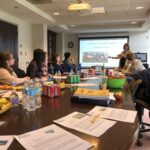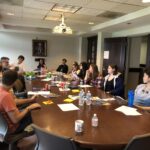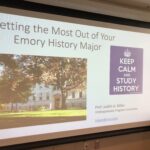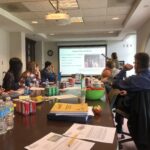Assistant Professor of History Dawn Peterson published Indians in the Family: Adoption and the Politics of Antebellum Expansion with Harvard University Press in June of 2017. Below, she offers a glimpse into the making of the monograph as a part of the History Department’s series on recent faculty publications.
Books are produced over years if not decades. Give us a sense for the lifespan of this book, from initial idea to final edits.
I first came across the sources that gave this book life around 2004 after reading Michael Paul Rogin’s groundbreaking book, Fathers and Children: Andrew Jackson and the Subjugation of the American Indian. I spent the following eleven years tracking down documents, contextualizing them within American Indian history and slavery studies, and putting my ideas down on paper. I completed my final copyedits in the spring of 2017, a few months before the book was released. So, all in all, the book took well over a decade from start to finish.
What was the research process like?
The sources I utilize in Indians in Indians in the Family come from archives across the country. I would find bits and pieces of information on the individuals about whom I wrote in one set of documents and then, going off of hunches based on what I had learned from these sources, I would travel to a different archive in the hopes of finding additional documents that would allow me to get a greater sense of the events and actions that shaped their lives. For example, tracking down sources relating to James McDonald (Choctaw)—one of the adoptees whose life greatly influenced the narrative of my book—ended up involving travels to collections in what is currently California, Oklahoma, Kentucky, and Washington, D.C. I was also incredibly fortunate to swap research with other scholars who shared my interests. Indeed, as I got deeper into my book, I connected with a number of people—including descendants of some of the individuals about whom I wrote—who generously collaborated with me by sharing ideas and sources or by pointing me to collections with which I was not yet familiar. Their insights on kinship, archives, and genealogy were crucial to the formation of my book.
Do you have a favorite chapter or section?
I can’t say that I do. Each chapter dealt with issues that were central to my own personal, intellectual, and political journey so it feels impossible for me to settle on any particular one as a favorite.
How does this project align with your broad research agenda?
This book formed in the wake of the September 11, 2001 attacks and the second Bush administration’s so-called War on Terror. As the United States embroiled itself in new imperial wars overseas and continued assaults on vulnerable communities within its borders, I found myself needing to better understand the intersecting roles of violence, empire, and kinship in North American history. Why, for example, did the United States imagine itself as a “national family” victimized by 9/11 and how did ideas about race, gender, and sexuality orient this national kinship structure? Why and how did “family” come to play such an important role in U.S. nationalism and what role did empire play in shaping it? I found many answers to these questions in the roots of U.S. imperialism, which of course took ground in Indian Country and were strengthened by the enslavement of Africans and African Americans. My first book focused on adoption as a vantage point into the gendered and racialized inequalities that shaped and oriented ideas about an “American family” during the post-Revolutionary period. My second project examines Southeast Indian women’s trade relationships in the late eighteenth and early nineteenth centuries to better understand how notions of kinship among people of European, African, and American Indian descent shaped economic decisions and produced concepts of race, gender, and sovereignty.



